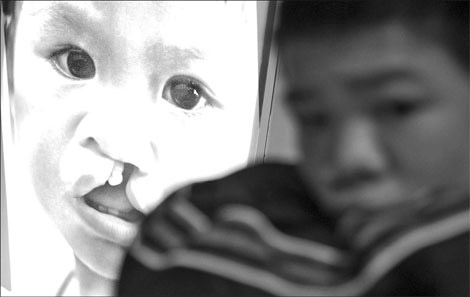 |
|
A boy from Zhejiang's provincial capital Hangzhou, who was born with a cleft lip, receives a free surgery from the US-based nonprofit Operation Smile. Huang Zhengsheng / For China Daily |
The 18-year-old has been wearing sunglasses for weeks to hide her swollen eyes, since undergoing double eyelid surgery. But even so, she thinks the future looks bright. "I'm counting the days until I can take the stitches out and remove the glasses," says Zhang Li (not her real name).
She is a beneficiary of the Rainbow China charity program that provides free cosmetic surgery to congenitally disfigured individuals who cannot afford the procedures they need.
It is backed by the Volunteer Working Committee of China Charity Federation, the Lotus Love Fund of the China Youth Development Foundation, and Dfhon.com, a website that provides plastic surgery information.
Dozens of hospitals nationwide have joined the program launched in late March to offer free operations to at least two people a year.
Zhang Li was among the first to benefit from the initiative.
Born in a small village in Gaomi county in Weifang city, Shandong province, and adopted by a farming family, Zhang grew up battling discrimination because, as she puts it: "I was just plain ugly."
Her drooping eyelids and thin eyes, together with a flat nose, made her look odd.
She says even relatives of her adopted family would make fun of the way she looked. And at middle school, when she had a crush on a boy, he told her to stay away from him.
Zhang quit school at age 13. "I was always the ugliest kid, very ugly," she says. "I saw no future in schooling. My family was poor, so all I wanted was to make some money for plastic surgery to make myself look presentable."
Even so, she found that job opportunities were limited because of her appearance and all she could find was work as a chef's assistant or cleaner at small restaurants, earning about 600 yuan ($95) to 800 yuan a month.
Eye surgery would cost about 3,000 yuan, while a nose operation would require at least 8,000 yuan, Zhang discovered. It was way beyond her means.
Zhang didn't give up on her dream, however, and came across information about Rainbow China when she searched online about plastic surgery.
"It felt like I won the lottery when they told me I was selected," she says.
About 35,000 children in China are born with cleft lips every year. That's one in every 600-700 births, according to Operation Smile, a US-based nonprofit.
Deformed ears, birthmarks and drooping eyelids are the other most common genetic deformities in China, especially in rural areas, says Xiu Zhifu, president of the Chinese Union of Plastic Surgery Doctors.
"In a village, birth defects are viewed as a disgrace for the whole family," Xiu says. "And discrimination will harm the child psychologically."
He adds that such individuals are usually shy and tend to be asocial.
Chen Li, 25, from Shaoxing city, Zhejiang province, was born with a lesion on her upper lip that became infected and ended up looking like two pieces of cloth stuck together.
Kids called her "harelip", and as she grew older, she started to prefer her own company.
After graduating as an English major, she decided to become a factory clerk rather than go into international trading, like her classmates, because she wanted a job where she didn't have to meet too many people.
She says it was difficult to get the job because of her appearance. She earns just 1,800 yuan a month - far less than her fellow graduates.
Her family has no savings, and the cost of surgery is estimated at 50,000 yuan.
"My life is colorless and I don't have a boyfriend," she says. Her father often tells her that others are worse off, though this does not console her, she says.
Thanks to Rainbow China, she is now awaiting surgery, but says she is not optimistic about the future.
"People don't understand the mental torture I have experienced," she says. "Even if the surgery is a success, my character has been forged, and that cannot be changed by a surgery."
The Rainbow China program requires applicants to provide documents proving they cannot afford surgery, either through an online application or by post.
By May 5, there were 50 applicants, most of whom were born in rural areas after 1980 and learned about the program via the Internet.
"We have to carefully match the applicants with the hospitals to ensure of the success of the surgeries," program organizer Fu Shunyan says.
"We hope potential applicants who don't have access to Rainbow China Program information on the Internet will be informed by others who do."
